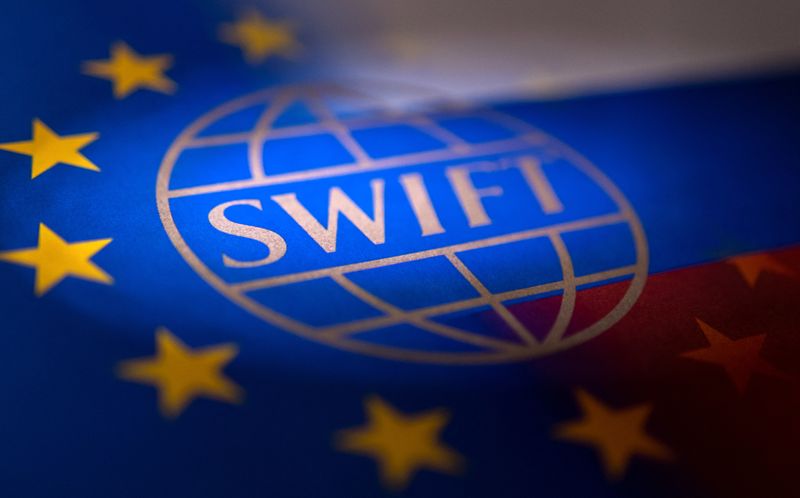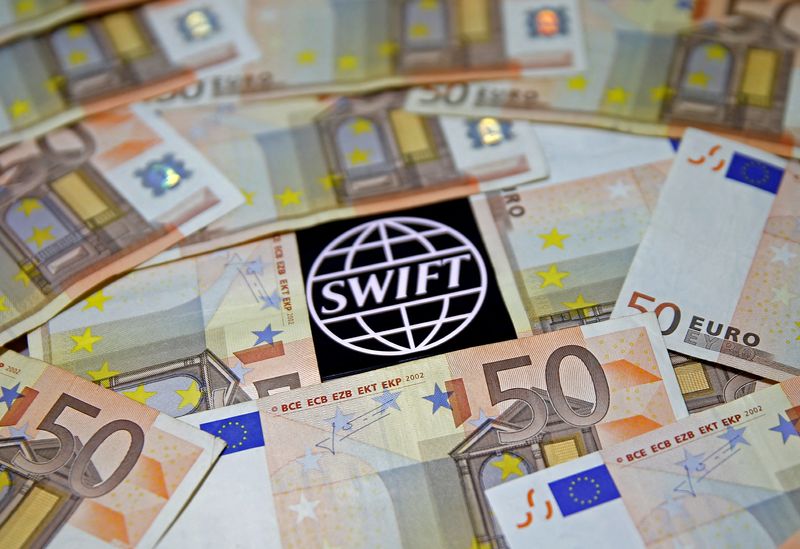(Refiles to correct spelling of Bank Otkritie in paragraph 2)
By Philip Blenkinsop
BRUSSELS – The European Union said on Wednesday it was excluding seven Russian banks from the SWIFT messaging system, but stopped short of including those handling energy payments, in the latest sanctions imposed on Russia over its invasion of Ukraine.
Russia’s second-largest bank VTB, Bank Otkritie, Novikombank, Promsvyazbank, Bank Rossiya, Sovcombank and VEB will each be given 10 days to wind-down their SWIFT operations, the EU said in its official journal.
SWIFT is the dominant messaging system underpinning global financial transactions and the EU, the United States, Britain and Canada moved on Saturday to block certain Russian banks from it, but had not said which would be hit.
The United States and Britain had been pushing for the SWIFT ban, but some in the euro zone had taken some persuading given the region’s reliance on Russian energy exports.
Removing Russian banks from SWIFT, a measure seen as drastic and unlikely only a week ago, is one of the most powerful tools Western authorities have used to punish Russia for what Moscow describes as a “special operation” in Ukraine.
A senior EU official said the banks were chosen based on their connections to the Russian state, with public banks already sanctioned after Russia’s annexation of Crimea in 2014.
“All these banks that we have listed under SWIFT… they are all based on their connection to the state and the implicit connection to the war effort. We have not gone for a blanket ban across the whole banking system,” the official said.
Sberbank, Russia’s largest lender, and Gazprombank were not included because they are the main channels for payments for Russian oil and gas, which EU countries are still buying despite the conflict in Ukraine.
The EU official added that these two Russian banks were nevertheless subject to other measures.
Officials have been concerned about disrupting energy flows to Europe and the official said it was not possible simply to allow energy-related transactions and exclude others as SWIFT was unable to differentiate between types of payments.
Polish Prime Minister Mateusz Morawiecki said the decision to exclude Sberbank and Gazprombank from sanctions due to “transactions related to energy supplies to the EU” was unacceptable.
“As Poland, we demand that all Russian entities, thanks to which Russia finances the war in Ukraine, be effectively and fully covered by sanctions,” he wrote on Facebook.
Lithuanian Prime Minister Ingrida Simonyte told a news briefing that more Russian banks could be excluded from SWIFT, which has 11,000 members and no clear global rival.
Although China has set up a system, it remains small, EU officials said, and despite the existence of a Russian system, SWIFT was still used for some 70% of transfers there.
Banks could still carry out transfers through work-arounds such as faxes or bilateral messaging systems, if they existed.
VEB said it was largely focused on domestic projects which were unaffected. For overseas-related businesses it would use SPFS, a messaging system developed by Russia’s central bank.
Sovcombank said SWIFT would not impact it because other sanctions had already blocked its ability to make overseas payments. Promsvyazbank said it was prepared for the disconnection from SWIFT and it would not have a significant impact on the bank’s operations.
VTB and Otkritie said they would not be impacted.
Novikombank and Bank Rossiya did not respond to requests for comment.
(Reporting by Philip Blenkinsop; Writing by Tommy Wilkes; Additional reporting by Anna Koper in Warsaw; Editing by Huw Jones and Alexander Smith)

